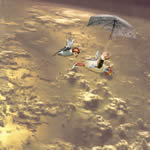|
|
 |
Dusted Reviews
Artist: Adem Album: Homesongs Label: Domino Review date: Jul. 15, 2004 |

|
|
|
 |
Adem Ilhan may be one-third of Fridge, but you certainly wouldn’t know it from listening to Homesongs. Wandering far from the sounds of his famed trio and bandmate Kieran Hebden’s solo material, Adem explores an entirely different musical path on his solo debut. Essentially, Homesongs is a folk record, built on solid foundation of strummed acoustic guitar and plaintive romantic lyrics, along with the occasional flourish of flutes and uilleann pipes. It may be an unexpectedly traditional and conservative album, but it’s also an unexpectedly beautiful one.
The most folk-oriented material on Homesongs draws from a distinctly British pool of influences: Adem’s melodies have a strong Celtic flavor, and his lyrics often sound like updated versions of the traditional English ballads favored by Fairport Convention and the like. While Ilhan’s sound certainly owes much to his folk forebears, it’s the poppier elements he adds into the mix that make Homesongs something special. They may not be readily apparent, but baroque pop influences loom over the album, turning initially simple tunes like “These are Your Friends” and “One in a Million” into elaborately-orchestrated workouts. It also doesn’t hurt that Ilhan’s voice at times recalls the Divine Comedy’s Neil Hannon, a decidedly un-folky performer. Whether aiming for sparse beauty on the stripped down tracks or for anthemic grandeur on the more fully produced ones, Homesongs consistently hits its mark.
Homesongs clearly privileges a traditional and established aesthetic over personal idiosyncrasies and experimentation, but that’s precisely what makes it so compelling. Adem creates music that seems to flow from a commonly-held past rather than from his own unique voice or persona. One only needs to listen to the album-closing stunner “There Will Always Be” to see what Homesongs is really all about: to a soaring Celtic melody, Adem advises, “Look to the stars to guide / You’ll find all you need in life to get by.” Though the declaration may read trite, it rings true here, like the wisdom of some ancient text, both timeless and completely at home in the present.
By Michael Cramer
|







